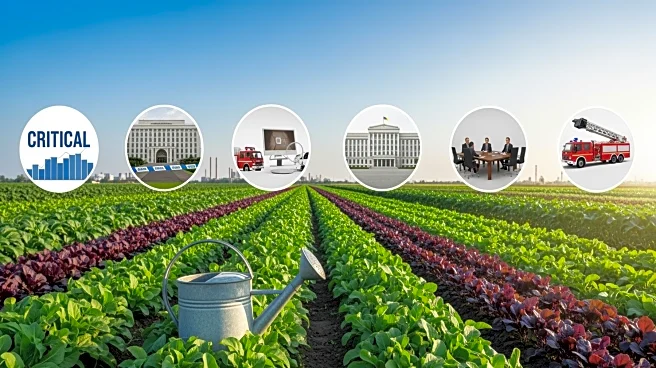What's Happening?
A new analysis by Climate Focus for the Family Farmers for Climate Action (FFCA) reveals that smallholder farmers require $443 billion annually to meet climate adaptation costs. This figure is less than
the $470 billion spent on harmful agricultural subsidies, according to the UN. The research highlights the need for increased investment in smallholder farmers, who produce half of the world's food calories and support 2.5 billion livelihoods globally. The study emphasizes the importance of investing in smallholder adaptation to enhance food security and build climate resilience. The FFCA, representing 95 million small-scale producers, advocates for sustainable practices like agroecology to restore nature's safety net.
Why It's Important?
The findings underscore the critical role smallholder farmers play in global food security and climate resilience. Investing in their adaptation is not only an economic necessity but also an ecological imperative. Smallholders are central to global supply chains for commodities such as rice, wheat, cocoa, and coffee. The report calls for a major boost in adaptation finance to protect farms from climate-related challenges like storms, droughts, and heatwaves. Enhanced financial support for smallholders could lead to significant improvements in global food security and environmental sustainability.
What's Next?
The COP30 Climate Summit will focus on adaptation, with discussions expected on indicators to track progress on global adaptation goals. However, specific indicators on finance flows to smallholders are not yet included. The Brazilian Presidency’s Action Agenda aims to mobilize finance for sustainable agriculture and bring family farmers' voices into discussions on finance, loss, and damage. Governments and funders are urged to facilitate direct access to finance for family farmer organizations and support the creation of a Farmers Resiliency Fund.
Beyond the Headlines
The report highlights the need for a shift in agricultural policy to prioritize sustainable practices and climate resilience. Supporting smallholders in scaling up agroecology could transform scarcity into abundance, benefiting both the environment and global food systems. The FFCA campaign advocates for a just transition that includes family farmers in decision-making processes, ensuring their needs and contributions are recognized in climate policy.












